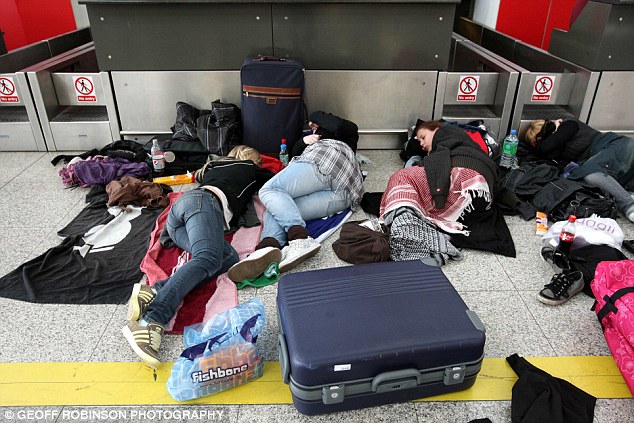
CeMoRe Workshop - Stranded: Lava, dust, people and aeroplanes
Date: 27 May 2010 Time: 11.00am to 4.30pm
Venue: Bowland North Seminar Room 25

Stranded at the airport
Stranded: Lava, dust, people and aeroplanes
Workshop 27 May 2010, 11am - 4:30pm, Bowland North Seminar Room 25
Organised by: David Barton, Monika Buscher, John Urry
In this workshop we discuss the immobilization of thousands of travellers caused by the volcanic ash from Iceland's Eyjafjallajökull volcano. We would like to invite presentations on experiences, implications and inspiration, including:
- pleasures and anxieties of enforced waiting, uncertainty and delayed arrival
- 'slow travel' and novel forms of travel
- experiences of silences and absence of contrails across our land- and cityscapes
- communication practices, use of social technologies and ICT
- implications for the economy, politics and mobility futures
- emergency management and leadership
- unified air traffic system and standards
Preliminary programme
11:00 - 11:15 Coffee & introductions
11:15 - 12:15 Short presentations I
- David Barton
- Jane Sunderland
- Jo Guiver
12:15 - 12.45 Lunch & discussion
12:45 - 13.45 Short presentations II
- Greg Myers
- Bulent Diken
- Monika Buscher
13.45 - 14.00 discussion and conclusion
Abstracts
David Barton, Lancaster University - Volcanic flows: people and technologies as resources in uncertain situations
This exploratory paper is concerned with people's decision making when moving around the world in uncertain situations. It focuses on the communication practices of a group of people brought together in a hired coach travelling from Norway to Britain. Drawing on the approaches of literacy studies along with broader work on new technologies, it focuses on how people integrated languages and technologies as global resources for local decision making and how they deployed different networks of support in a changing situation. The paper raises more general issues for people experiencing disrupted travel and uncertainty and it enriches understanding of people using technologies and acting within complex networks.
Jane Sunderland, Applied Linguistics, Lancaster University - Mixed experience
Being stranded in Nigeria for 3 days as a very mixed experience: a sort of house arrest (safe, comfortable, but with walls, who knew for how long, and the uncertainty of all that), appreciation of the genuine kindness of very new acquaintances, getting used to not being able to function independently, responding to well-meaning but ultimately foolish suggestions of friends, family, and, dare I say it, colleagues.
And then living with the slight regret in Frankfurt of taking the easy option of a confirmed flight in 2 days time, rather than going for the booked-up trains, chaotic buses and Calais bottleneck experience - i.e. missing out.
Jo Guiver, UCLAN - On 19th April the Institute of Transport and Tourism (University of Central Lancashire) launched an on-line survey for passengers whose travel was disrupted by the volcanic ash cloud. To date we have had almost 500 replies to the survey which was distributed through a number of networks. The preliminary findings will be presented at the workshop.
Link to survey http://www.surveymonkey.com/s/AirCrisisSurveyITT
Greg Myers, Lancaster - Inaction at a distance: what I could and couldn't do from the Stone Village Tourist Camp, Fort Davis, Texas
Well before the rise of the web and mobile computing, Dede Boden and Harvey Molotch wrote about 'The compulsion to proximity'. They pointed out that while many leaders even then had the technical means to do their interacting in mediated form, via phone, e-mail, or video link, they still preferred to meet face to face before important decisions. They argued that this preference persisted because physical co-presence allowed for the rich flow of information in real time, and they needed subtle cues of gesture, posture, and contact. In May 2010, thousands of people had the chance to test whether Boden's and Molotch's observations still held true in a period of dispersed, mobile, shared, broadband computing. I, for instance, spent an unexpected but pleasant 8 days in West Texas, in El Paso, Austin, and Fort Davis. I had my new netbook and a Flip videorecorder, and in all these places one could have broadband access just about anywhere one could sleep, eat, drink a coffee, or sit down. During the week, I used e-mail, the web, Google docs, Skype, Youtube, and through VPN, my office computer and such university resources as the Metalib library databases, the pFACT project accounting system, the Stonefish recruitment system, the Agresso finance system. I got in touch with my work colleagues immediately, and tried throughout the week to keep up with the routine and not so routine work of a department head, This paper is about what I could and could not do with all these resources.
Monika Buscher, Lancaster University - Mobility uncertain
Based on personal experience of flight cancellations in the second round of UK airspace restrictions, this short presentation explores the uncertainty of disrupted travel. I am interested in how the immobilised react and in the process discover and shape aspects of their embodied 'suspension' in complex personal, digital, material and natural systems.
Boden, D. and Molotch, H. (1994) 'The compulsion to proximity', in R. Friedland and D.
Boden (eds.) Now/Here: time, space and modernity. Berkeley, CA: University of California Press. pp. 257-86.
[abstract submitted from a Virgin train stopped somewhere around Rugby]
Contact:
Who can attend: Anyone
Further information
Associated staff: David Barton (Linguistics and English Language), Monika Büscher, Greg Myers (Linguistics and English Language), John Urry
Organising departments and research centres: Centre for Mobilities Research (CeMoRe), Geography, Lancaster Environment Centre, Lancaster Institute for the Contemporary Arts, Lancaster Literacy Research Centre, Linguistics and English Language, Media and Cultural Studies, Mobilities.Lab, Sociology
Keywords: Mobilities, Transportation, Travel
Faculty News & Events
Find out about news and events in other departments:
| News and Events | Links | Contact |